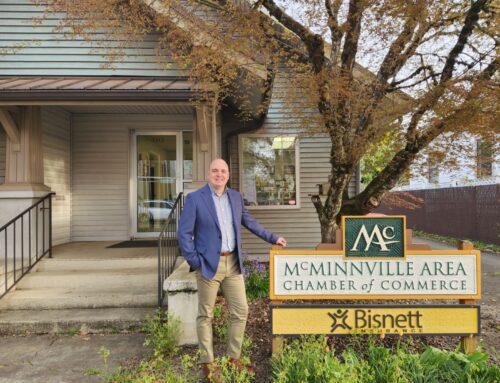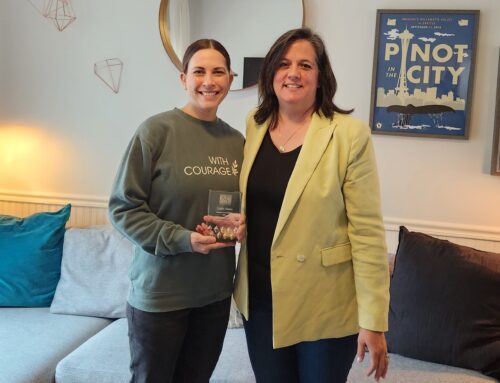From Monday, January 13 through Wednesday, January 15, Oregon State Representatives and Senators returned to the State Capitol in Salem for a final series of “Legislative Days,” the last official committee hearings before the 2020 Legislative Session begins on Monday, February 3.
Legislators were busy meeting with constituents and advocates in the lobby and in their offices between assigned hearings, which were scheduled throughout each day. Hearings began as early as 8:00 AM, and the latest hearings of the day scheduled for 3:00 PM. There were 14 hearings on Monday, and 12 on both Tuesday and Wednesday.
Click the links above to view the list of that day’s hearings and replay the video recording of a hearing on a topic that interests you!
Highlights and Takeaways
The week kicked off with a hearing on a familiar and controversial topic: cap and trade. With the Hearing Room at capacity, a large crowd of lobbyists and activists watched live from the lobby TVs as the Senate Interim Committee on Environment and Natural Resources premiered Legislative Concept (LC) 19, a 156-page proposal (with an emergency clause) that proponents are calling the Oregon Greenhouse Gas (GHG) Initiative.
Aimed at reducing greenhouse gas emissions within the state to 45% below 1990 levels by 2035 and 80% below 1990 levels by 2050, LC 19 would place a gradually declining limit across total emissions from regulated sectors and establish a new Office of Greenhouse Gas Regulation (with a seven-member, Governor-appointed Board) within the Department of Environmental Quality (DEQ). Chief Sponsor Senator Michael Dembrow (D-Portland) stressed that the bill is a work-in-progress and took care to point out that the policy includes significant concessions from provisions of the Legislature’s last attempt to implement cap and trade in Oregon, House Bill 2020. Please click here for Senator Dembrow’s Summary of Core Elements of LC 19, which will become Senate Bill (SB) 1530.
Throughout the three-hour hearing, 24 professional advocates representing entities both for and against the proposal aired their concerns before lawmakers. For some, LC 19 doesn’t go far enough: in regulating emissions and guaranteeing investments in specific communities (Oregon Environmental Council), or in strengthening labor standards and funding a robust “Just Transition Program” for workers who may lose their jobs under cap and trade (Oregon AFL-CIO).
For others, the policy is either unworkable due to the immediate increase in fuel costs and potential negative impacts on the Highway Trust Fund (Oregon Trucking Association and the Association of Oregon Counties, et al.), or needs amending to preempt local jurisdictions from enacting harsher emissions caps, carbon taxes, or utility regulations to earn the support of the business community (Portland Business Alliance).
Over 100 individuals and companies from across Oregon submitted testimony on the draft of LC 19, and the full hearing can be viewed here. Chamber Members are invited to attend the next meeting of the Chamber Government Affairs Council (GAC) on January 30 where there will be evaluation and discussion of upcoming legislation, including LC 19/SB 1530.
On Tuesday, the House Interim Committee on Economic Development heard a presentation on Oregon’s Opportunity Zones and debuted their three Committee LCs for the 2020 Session: LC 241, LC 247, and LC 248.
LC 241 relates to improving access to capital for small businesses, microenterprises, and start-up businesses by appropriating $5 million additional General Fund dollars to Business Oregon for the creation of a community lender loan loss account program, directing the Oregon Entrepreneurs Network to engage the entrepreneur ecosystem, analyze the needs of Oregon small businesses, collaborate with the University of Oregon’s Lundquist College of Business for the 2020 Oregon Capital Scan (2018), and make official legislative recommendations by November 30, 2020.
LCs 247 and 248 both relate to the ongoing and future regulation of the Oregon Medical Marijuana Program, the future of which remains uncertain since the purchase and restricted usage of recreational marijuana by adults over 21 was legalized by voters in 2016.
Later, the Senate Interim Committee on Labor and Business unveiled their Committee Bills – LC 73, LC 74, and LC 75. LC 73 relates to projects receiving public expenditures and would require businesses seeking property tax exemptions under the Enterprise Zone (EZ), Long-Term Rural Enterprise Zone (LTREZ), or Strategic Investment Program (SIP) economic development incentive programs to advertise seeking bids for construction projects and to report any project labor agreements to the incentive sponsor.
LC 75, the 2020 Session priority bill of the Oregon AFL-CIO, would restrict employers from entering into unenforceable non-competition agreements, shorten the term of a non-competition agreement from 18 months to six months, and legally modify the definition of such agreements. Furthermore, it would require an employer to agree in writing to provide a specified minimum required compensation during the proposed modified term of enforcement.
The final day of Legislative Days saw hearings from Senate Finance and Revenue, House Energy and Environment, Senate Housing and Development, and House Agriculture and Land Use. In Senate Finance and Revenue, the Committee discussed LC 249 (to become HB 4009) – modifying administrative provisions of the Corporate Activity Tax.
In Senate Housing and Development, the Committee introduced LC 95, a Habitat for Humanity of Oregon-sponsored initiative aimed at supporting low-income homeowners with dwellings in need of serious repair, as well as LC 97, which would authorize Oregon Housing and Community Services to provide grants and technical assistance to organizations assisting tenants in eviction proceedings.
Local Spotlight
Representative Ron Noble (R-McMinnville) will introduce two important bills this session. LC 227 would secure additional funding specifically for co-located domestic violence advocates in the budget for the Department of Human Services, and LC 239 would address a problem Oregon pharmacies are experiencing with the new Corporate Activity Tax (CAT). Currently, pharmacies are unable to pass along the costs of the CAT to their customers because the contracts they have with Pharmacy Benefit Managers (PBMs) prohibit pharmacies from adding taxes to the cost of prescription drugs unless it is a sales tax. LC 239 would prohibit businesses from preventing other businesses from passing through costs or a portion of the costs associated with the payment of Oregon’s CAT.
**McMinnville Town Hall Reminder**
On Thursday, January 30th at 6:00 PM the Chamber is hosting a Town Hall with Representative Ron Noble and Senator Brian Boquist at McMinnville Civic Hall – 200 NE Second St. There is no charge to attend and Chamber Members are encouraged to bring their friends and family to hear from our representatives in Salem and ask questions about the upcoming 2020 Legislative Session.





